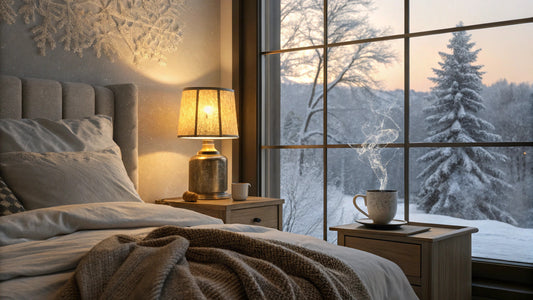
Seasonal Sleep Tips: Staying Comfortable in the Cold Winter
Answer: Winter challenges your rest through colder temperatures, reduced daylight, and dry indoor air. By optimizing room temperature, using the right bedding, and tuning your sleep habits to the season, you can sleep more deeply, wake more refreshed, and feel more energized.
What Temperature Helps You Sleep Best in Winter?
Answer: Aim to keep your bedroom comfortably cool—between 15–19 °C (60–67 °F). Cooler conditions support your body’s natural temperature drop during sleep, helping you fall asleep faster and stay asleep longer.
How Should Your Bed Be Layered for Cold Nights?
Answer: Focus on warmth without overheating:
-
Layer bedding—start with breathable cotton, add flannel or light fleece, and top with a well-fitting duvet or quilt.
-
Try a preheated hot water bottle or heating pad at your feet—it helps relax the body while keeping the room cool.
How Do You Sustain Healthy Sleep Rhythms When Days Are Short?
Answer: Winter’s shorter days can disrupt your circadian rhythm. Counter this by:
-
Getting bright light exposure in the morning—ideally natural sunlight, or using a light therapy lamp.
-
Maintaining a consistent sleep schedule—even on weekends.
-
Creating a soothing bedtime routine that signals your body it’s time to wind down.
What Else Can Support Winter Sleep?
Answer: A few more simple strategies that add big benefits:
-
Avoid stimulants like caffeine, alcohol, and heavy meals close to bedtime.
-
Use a humidifier—dry air can cause discomfort like dry nose or throat, disrupting sleep.
-
Keep electronics out of the bedroom to reduce blue light and mental stimulation before sleep.
Quick Winter Sleep Checklist
| Tip | Why It Works |
|---|---|
| Keep room 15–19 °C | Supports the body’s natural temperature regulation |
| Layer bedding, preheat feet | Keeps you warm without overheating your sleep environment |
| Boost bright light in morning | Helps stabilize your circadian rhythm |
| Stick to a bedtime routine | Conditions your brain and body for sleep |
| Limit caffeine/alcohol | Prevents disruptions to sleep onset and quality |
| Use a humidifier | Adds comfort and prevents irritation from dry winter air |
| Remove screens before bed | Reduces light and mental stimulation for easier falling asleep |
Final Thoughts
Winter sleep doesn’t have to suffer. By embracing the season’s needs—cooler air, shorter days, and cozy bedding—you can sleep more soundly and wake more revitalized. Tailor your nighttime environment and habits to match these needs, and your sleep can even improve during the coldest months.



